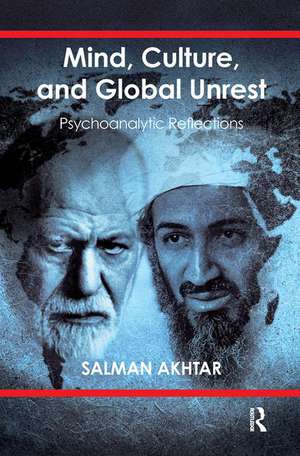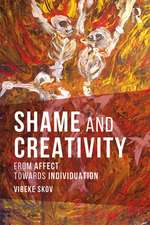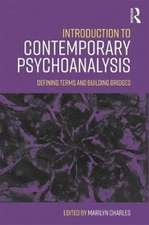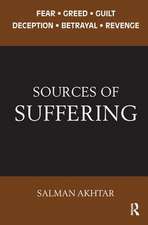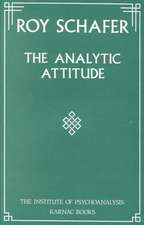Mind, Culture, and Global Unrest: Psychoanalytic Reflections
Autor Salman Akhtaren Limba Engleză Hardback – 18 sep 2018
| Toate formatele și edițiile | Preț | Express |
|---|---|---|
| Paperback (1) | 315.25 lei 6-8 săpt. | |
| Taylor & Francis – 13 feb 2018 | 315.25 lei 6-8 săpt. | |
| Hardback (1) | 874.91 lei 6-8 săpt. | |
| Taylor & Francis – 18 sep 2018 | 874.91 lei 6-8 săpt. |
Preț: 874.91 lei
Preț vechi: 1102.76 lei
-21% Nou
Puncte Express: 1312
Preț estimativ în valută:
167.42€ • 175.24$ • 139.34£
167.42€ • 175.24$ • 139.34£
Carte tipărită la comandă
Livrare economică 31 martie-14 aprilie
Preluare comenzi: 021 569.72.76
Specificații
ISBN-13: 9781138371972
ISBN-10: 1138371971
Pagini: 248
Dimensiuni: 152 x 229 mm
Greutate: 0.45 kg
Ediția:1
Editura: Taylor & Francis
Colecția Routledge
Locul publicării:Oxford, United Kingdom
ISBN-10: 1138371971
Pagini: 248
Dimensiuni: 152 x 229 mm
Greutate: 0.45 kg
Ediția:1
Editura: Taylor & Francis
Colecția Routledge
Locul publicării:Oxford, United Kingdom
Public țintă
Professional Practice & DevelopmentCuprins
INTRODUCTION
PROLOGUE
CHAPTER ONE Culture and psychoanalysis: theory and technique
CURRENT GLOBAL UNREST
CHAPTER TWO Religion, politics, and migration across national borders
CHAPTER THREE The mental pain of minorities
CHAPTER FOUR Racial, religious, and ethnic prejudice
CHAPTER FIVE The current wave of terrorism
CHAPTER SIX The ultimate abyss of dehumanization
EPILOGUE
CHAPTER SEVEN Culture and psychoanalysis: education and training
PROLOGUE
CHAPTER ONE Culture and psychoanalysis: theory and technique
CURRENT GLOBAL UNREST
CHAPTER TWO Religion, politics, and migration across national borders
CHAPTER THREE The mental pain of minorities
CHAPTER FOUR Racial, religious, and ethnic prejudice
CHAPTER FIVE The current wave of terrorism
CHAPTER SIX The ultimate abyss of dehumanization
EPILOGUE
CHAPTER SEVEN Culture and psychoanalysis: education and training
Recenzii
Salman Akhtar’s book is an impressive and passionate plea for a culturally relevant psychoanalysis. His deep knowledge of the field enables him to describe the issues with a bilateral flow of information between psychoanalysis and the humanities. He brilliantly explores current questions of migration, minorities, social prejudices, and terrorism. He also offers strategies for diminution of the pain of minorities and of prejudices as well as guidelines for the remediation of processes of dehumanization associated with terrorism. This book is an urgently needed psychoanalytic contribution to our present social and political problems.
Werner Bohleber, Frankfurt
This is an extremely captivating, timely and courageous book. It reveals Salman Akhtar's highly original hermeneutics and pragmatic vision of the current global crisis. Akhtar addresses the contemporary chaos and dislocation of the spirit of our times from the lens of his ‘anthropological psychoanalysis’. He speaks the unspeakable and unmasks the politically uncomfortable, while remaining faithful to his personal sense of poetics, psychoanalysis, and fairness in human affairs.
Gohar Homayounpour, Tehran
In this book, the prolific psychoanalyst, Salman Akhtar, leaves the comfort of clinical practice and turns his gaze to current global turmoil. By forging dialectal links between unconscious intrapsychic dynamics and sociocultural phenomena such as prejudice, the problems of minorities, and the complex origins of terrorism, he lays down the groundwork for a truly modern anthropological psychoanalysis. Akhtar’s book needs to be known not only to all psychoanalysts but outside the psychoanalytic circles as well.
Hanni Mann-Shalvi, Tel Aviv
Akhtar makes a brilliant case for an anthropologically-informed psychoanalysis and a culturally relativistic approach to patients and to political praxis. He recognizes that we, and those we treat and oppose, do not exist in a cultural vacuum; rather we and they think and work in our respective cultures with manifold unconscious assumptions. His work is deeply informed on the national, regional, and cultural permutations of Muslims and Islam and he offers trenchant recommendations for constructively dealing with the terrorism of radical and radicalized youth.
Peter Loewenberg, Los Angeles
Salman Akhtar’s book is an impressive and passionate plea for a culturally relevant psychoanalysis. His deep knowledge of the field enables him to describe the issues with a bilateral flow of information between psychoanalysis and the humanities. He brilliantly explores current questions of migration, minorities, social prejudices, and terrorism. He also offers strategies for diminution of the pain of minorities and of prejudices as well as guidelines for the remediation of processes of dehumanization associated with terrorism. This book is an urgently needed psychoanalytic contribution to our present social and political problems.
-Werner Bohleber, Frankfurt
This is an extremely captivating, timely and courageous book. It reveals Salman Akhtar's highly original hermeneutics and pragmatic vision of the current global crisis. Akhtar addresses the contemporary chaos and dislocation of the spirit of our times from the lens of his ‘anthropological psychoanalysis’. He speaks the unspeakable and unmasks the politically uncomfortable, while remaining faithful to his personal sense of poetics, psychoanalysis, and fairness in human affairs.
-Gohar Homayounpour, Tehran
In this book, the prolific psychoanalyst, Salman Akhtar, leaves the comfort of clinical practice and turns his gaze to current global turmoil. By forging dialectal links between unconscious intrapsychic dynamics and sociocultural phenomena such as prejudice, the problems of minorities, and the complex origins of terrorism, he lays down the groundwork for a truly modern anthropological psychoanalysis. Akhtar’s book needs to be known not only to all psychoanalysts but outside the psychoanalytic circles as well.
-Hanni Mann-Shalvi, Tel Aviv
Akhtar makes a brilliant case for an anthropologically-informed psychoanalysis and a culturally relativistic approach to patients and to political praxis. He recognizes that we, and those we treat and oppose, do not exist in a cultural vacuum; rather we and they think and work in our respective cultures with manifold unconscious assumptions. His work is deeply informed on the national, regional, and cultural permutations of Muslims and Islam and he offers trenchant recommendations for constructively dealing with the terrorism of radical and radicalized youth.
-Peter Loewenberg, Los Angeles
In an increasingly uncertain world of globalisation, terrorism and technological disruption, those who feel threatened will tend to project their fear outwards as aggression towards other cultural groups. Psychoanalysis provides an important level of understanding of the unconscious processes at play. Professor Akhtar provides us with an empathic and vital contribution with this book, and it must be hoped that this inspires the further engagement of psychoanalysis with culture and politics, both in and out of the consulting room.
-Rachael McKeown, Psychodynamic Practice Journal
Werner Bohleber, Frankfurt
This is an extremely captivating, timely and courageous book. It reveals Salman Akhtar's highly original hermeneutics and pragmatic vision of the current global crisis. Akhtar addresses the contemporary chaos and dislocation of the spirit of our times from the lens of his ‘anthropological psychoanalysis’. He speaks the unspeakable and unmasks the politically uncomfortable, while remaining faithful to his personal sense of poetics, psychoanalysis, and fairness in human affairs.
Gohar Homayounpour, Tehran
In this book, the prolific psychoanalyst, Salman Akhtar, leaves the comfort of clinical practice and turns his gaze to current global turmoil. By forging dialectal links between unconscious intrapsychic dynamics and sociocultural phenomena such as prejudice, the problems of minorities, and the complex origins of terrorism, he lays down the groundwork for a truly modern anthropological psychoanalysis. Akhtar’s book needs to be known not only to all psychoanalysts but outside the psychoanalytic circles as well.
Hanni Mann-Shalvi, Tel Aviv
Akhtar makes a brilliant case for an anthropologically-informed psychoanalysis and a culturally relativistic approach to patients and to political praxis. He recognizes that we, and those we treat and oppose, do not exist in a cultural vacuum; rather we and they think and work in our respective cultures with manifold unconscious assumptions. His work is deeply informed on the national, regional, and cultural permutations of Muslims and Islam and he offers trenchant recommendations for constructively dealing with the terrorism of radical and radicalized youth.
Peter Loewenberg, Los Angeles
Salman Akhtar’s book is an impressive and passionate plea for a culturally relevant psychoanalysis. His deep knowledge of the field enables him to describe the issues with a bilateral flow of information between psychoanalysis and the humanities. He brilliantly explores current questions of migration, minorities, social prejudices, and terrorism. He also offers strategies for diminution of the pain of minorities and of prejudices as well as guidelines for the remediation of processes of dehumanization associated with terrorism. This book is an urgently needed psychoanalytic contribution to our present social and political problems.
-Werner Bohleber, Frankfurt
This is an extremely captivating, timely and courageous book. It reveals Salman Akhtar's highly original hermeneutics and pragmatic vision of the current global crisis. Akhtar addresses the contemporary chaos and dislocation of the spirit of our times from the lens of his ‘anthropological psychoanalysis’. He speaks the unspeakable and unmasks the politically uncomfortable, while remaining faithful to his personal sense of poetics, psychoanalysis, and fairness in human affairs.
-Gohar Homayounpour, Tehran
In this book, the prolific psychoanalyst, Salman Akhtar, leaves the comfort of clinical practice and turns his gaze to current global turmoil. By forging dialectal links between unconscious intrapsychic dynamics and sociocultural phenomena such as prejudice, the problems of minorities, and the complex origins of terrorism, he lays down the groundwork for a truly modern anthropological psychoanalysis. Akhtar’s book needs to be known not only to all psychoanalysts but outside the psychoanalytic circles as well.
-Hanni Mann-Shalvi, Tel Aviv
Akhtar makes a brilliant case for an anthropologically-informed psychoanalysis and a culturally relativistic approach to patients and to political praxis. He recognizes that we, and those we treat and oppose, do not exist in a cultural vacuum; rather we and they think and work in our respective cultures with manifold unconscious assumptions. His work is deeply informed on the national, regional, and cultural permutations of Muslims and Islam and he offers trenchant recommendations for constructively dealing with the terrorism of radical and radicalized youth.
-Peter Loewenberg, Los Angeles
In an increasingly uncertain world of globalisation, terrorism and technological disruption, those who feel threatened will tend to project their fear outwards as aggression towards other cultural groups. Psychoanalysis provides an important level of understanding of the unconscious processes at play. Professor Akhtar provides us with an empathic and vital contribution with this book, and it must be hoped that this inspires the further engagement of psychoanalysis with culture and politics, both in and out of the consulting room.
-Rachael McKeown, Psychodynamic Practice Journal
Descriere
In this compact and pithy book, psychoanalyst Salman Akhtar steps out of his consulting room to address certain matters of urgent global concern. These include migration across national borders, the current refugee crisis, ethno-racial prejudice, subjective distress of minorities, and, above all, the ominous shadow of terrorism.
